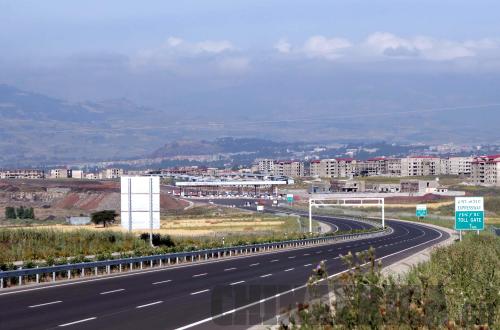|

Chinese longterm investment in African infrastructure
China has committed to a wide variety of investments in Africa, from agriculture, mining and infrastructure construction to processing, manufacturing, finance, commercial logistics and real estate. China's direct investment in the continent grew at an annual rate of 20.5 percent from 2009 to 2012, according to a white paper on China-Africa economic and trade cooperation issued by China's State Council in 2013. China's accumulative direct investment in Africa amounted to $30 billion by the end of 2014.
Chinese investments have created jobs, developed critically-needed infrastructure, and contributed to economic growth, particularly in sectors or geographic areas where international financial institutions and companies have been unwilling to engage.
However, while agreeing that Chinese investments have contributed positively to the living conditions and economic opportunities on the continent, some worry that these investments are short-term, seeking quick profits.
But both Charles Wang, marketing representative of UnionPay, and Richard Heinz Leiter, Executive Director of First Automotive Works (FAW) Vehicle Manufacturers, were confident about Chinese companies' commitment to Africa's economic growth and predicted Chinese investment will continue to increase amid stronger China-Africa ties.
The two senior executives from Chinese companies operating in South Africa shared their views on this subject at a panel discussion on China-Africa relations, held jointly by the South Africa-based investment advisory firm Frontier Advisory and Henley Business School in Johannesburg.
Lasting engagement
Established in 1953, the FAW Group, a leading Chinese vehicle manufacturer headquartered in Jilin Province, northeast China, entered South Africa in 1994. It launched a 600-million-rand ($44.6 million) plant in the Coega Industrial Development Zone in Port Elizabeth, South Africa, in July 2014.
FAW's 30,000-square-meter factory, complete with training facilities, produces trucks and truck-related merchandise. In the first phase, it plans to produce 5,000 trucks annually and create 280 jobs.
"Everything is long-term," Leiter said of Chinese investment coming to Africa. "Nothing is [a] short-term deal. It is all about 20 or 30 or even 50 years." That was how Chinese companies did business, he added.
Initially, FAW products were not well-received in the brand-sensitive South African market, according to Leiter. Even the Japanese and South Korean auto brands that preceded FAW in South Africa had the same experience though they were well-established. However, Leiter predicted FAW's brand would become more accepted in the next five to 10 years.
Seeking global operations
One reason Chinese companies are moving offshore is that manufacturing costs in China have become high, both Leiter and Wang said.
Wang said a university graduate in China used to be paid a monthly salary between 2,000 yuan ($322) and 3,000 yuan ($484) in the past, but now, the figures have more than doubled.
Leiter said FAW now sells products across Africa, from South Africa to Kenya, and Tanzania and Zambia to Angola, because manufacturing costs in South Africa are not as high as in China. Chinese companies' expansion abroad is also due to market demands.
Founded in 2002, UnionPay, the Chinese equivalent of credit cards such as Visa and MasterCard, has since issued 5 billion cards in 30 countries around the world and is accepted in 150 countries. Its transaction volume reached $1.9 billion in the first quarter of this year.
In Africa, the UnionPay card is issued in five countries and accepted in 45. The company has a niche product in the Democratic Republic of the Congo that is popular with Congolese businessmen. They can deposit any currency into their cards and use them in China to buy merchandise.
Wang explained that UnionPay has an integrated network and is "100 percent" accepted in China whereas other cards have only 17 percent share of the market.
The UnionPay card has also benefited from the huge number of Chinese tourists traveling abroad. In a recent market campaign, UnionPay and its collaborators offered card holders 5 to 10 percent discount at 16 international airports and 80 shopping districts in big cities such as Paris, New York and London. Such convenient arrangements benefit both foreign businesses and Chinese tourists.
Wang said he receives regular queries from African bankers about when UnionPay would begin operating in their countries.
Beneficial commitment
Agreeing with Leiter's "long-term" observation, Charles Wang said China considers Africa a good friend and brother, offering assistance in areas such as poverty alleviation and education.
"Chinese companies build hospitals, schools and infrastructure in Africa to help the local communities," Wang said. "They also offer low-interest loans at 2 to 5 percent."
Wang said Chinese investment in Africa is not driven by profits but to build relations and contribute to Africa's development. "I was taught Africa is a good friend and brother of China when I was at school," he said.
Back in the 1980s and 1990s, Wang said people used to say in China that if you want to get rich, build roads first. Realizing the importance of infrastructure to generate economic development, China is doing just that on the continent, he said.
"Africans have already benefited from Chinese investment," Leiter pointed out. "China is building roads and airports everywhere in Africa. In Harare, China built new roads they didn't have in the past 25 years."
(Reporting from South Africa) |